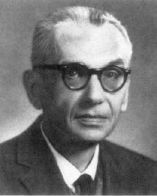

Kurt Gödel attended school in Brünn, completing his school studies in 1923. He entered the University of Vienna in 1923. As an undergraduate he took part
in Schlick's seminar on Russell's book Introduction to mathematical philosophy. It became slowly obvious that he would stick with logic and that he was incredibly talented.
He completed his doctoral dissertation under Hahn's supervision in 1929, and became a member of the faculty of the University of Vienna in 1930, where he
belonged to the school of logical positivism until 1938.
He is best known for his proof of Gödel's Incompleteness Theorems. In 1931, he published these results. He proved fundamental results about axiomatic systems showing in any axiomatic mathematical system there are propositions that cannot be proved or disproved within the axioms of the system. In particular the consistency of the axioms cannot be proved.
This ended a hundred years of attempts to establish axioms to put the whole of mathematics on an axiomatic basis. The theorem did not
destroy the fundamental idea of formalism, but it did demonstrate that any system would have to be more comprehensive than that envisaged by Hilbert's.
Gödel's results were a landmark in twentieth century mathematics, showing that mathematics is not a finished object, as had been believed. It also implies that a
computer can never be programmed to answer all mathematical questions.
In 1933 Hitler came to power. At first this had no effect on Gödel's life in Vienna, as he had little interest in politics. However after Schlick was murdered by a National Socialist student, Gödel was much affected and had his first breakdown.
Soon afer his recovery, he received an invitiation to be a guest professor at Princeton. There he gave a series of lectures entitled "On undecidable propositions of formal mathematical systems".
He returned to Vienna, and married in 1938, but when the war started he was fortunate to be able to return to the United States. In 1953 he obtained a chair at the Institute for Advanced Study in Princeton. Towards the end of his life he, became convinced that he was being poisoned and, refusing to eat to avoid being poisoned, starved himself to death.
His work Consistency of the axiom of choice and of the generalized continuum-hypothesis with the axioms of set theory, published in 1940 is a classic of modern mathematics.
He received the National Medal of Science in 1974.